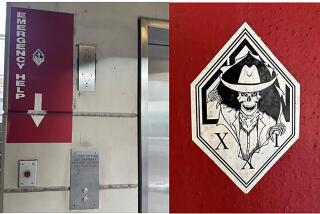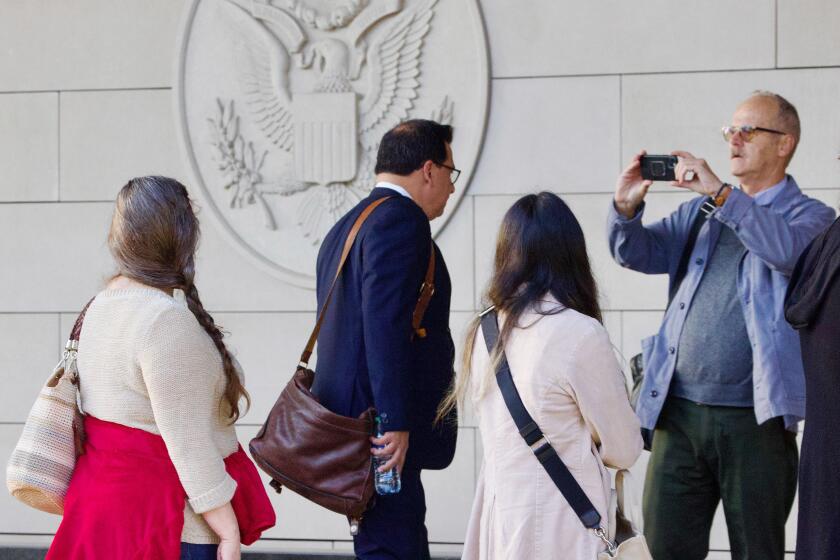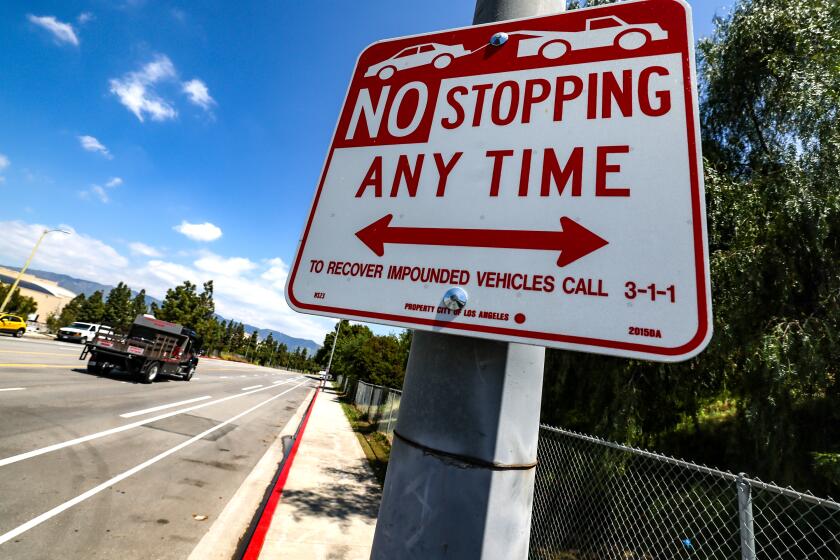L.A. sheriff says he’ll appeal decision barring him from giving prosecutors a list of problem deputies

Los Angeles County Sheriff Jim McDonnell explains to department members why he is appealing a recent court decision.
Los Angeles County Sheriff Jim McDonnell will ask the state Supreme Court to review a recent lower-court decision that barred him from giving prosecutors the names of deputies with histories of serious misconduct, he said in a statement Wednesday.
The appeal, which has not yet been filed, will seek to “establish legal clarity” while balancing the privacy protections of officers’ personnel files, according to the statement.
“Our intent was never to compromise or give away your rights. And at no time was the department seeking to voluntarily turn over information from anyone’s personnel file,” McDonnell said in a video issued internally to deputies on Wednesday.
But Det. Ron Hernandez, president of the Assn. for Los Angeles Deputy Sheriffs, called McDonnell’s position “ill-advised” and said the recent court ruling provided proper guidance that allows for the department to give prosecutors information on a case-by-case basis pursuant to a court order.
Several advocacy groups have called on the sheriff to appeal the decision, handed down two weeks ago by a Los Angeles appeals court.
The court ruled that the names of deputies found by internal investigators to have lied, stolen, falsified reports and committed other types of misconduct are confidential and cannot be handed over to prosecutors — even in pending criminal cases in which the deputies are listed as potential witnesses.
The decision was a victory for ALADS, the union that represents rank-and-file deputies, which sued the department last year over McDonnell’s attempt to give the district attorney’s office a list of about 300 deputies whose past misconduct could call into question their credibility as witnesses in court.
The 1963 U.S. Supreme Court decision in Brady vs. Maryland obligates prosecutors to turn over any evidence favorable to defendants, which could include information that undermines an officer’s credibility.
Police personnel files — including the findings of administrative proceedings and even an officer’s name in connection to any internal investigation — are confidential in California.
But many police agencies across the state regularly give local prosecutors the names of officers found in internal investigations to have committed certain types of misconduct as part of the prosecution team’s so-called “Brady obligation.”
“This is bigger than the LASD,” McDonnell said in the video to deputies.
“If we do not find a legal path to provide the information as required, the consequences could be severe. In the criminal cases where you make arrests, convictions may be overturned. We could be held civilly liable if someone is wrongfully convicted and a court finds that the sheriff’s department improperly withheld information relevant to the case. Or worse, local, state and federal prosecutors could elect not to file cases or bring them to trial at all,” he said.
The union has argued that disclosure of the list to prosecutors violates the state’s police confidentiality laws, and that the court’s recent decision does not impair a defendant’s right to a fair trial.
“McDonnell’s claim that the decision did not provide the ‘clarity’ needed ... is inaccurate,” Hernandez said in a text message. “It provided a clarity he disagrees with.”
The department has until Aug. 21 to file its petition to the state supreme court. The high court can decide whether or not to hear the case.
Twitter: @mayalau
ALSO
Sheriff investigates ‘disturbing’ claims of deputy misconduct with youth in mentoring program
Advocacy groups want L.A. sheriff to tell prosecutors about problem deputies
Orange County jail inmate found dead; five workers put on leave
More to Read
Start your day right
Sign up for Essential California for news, features and recommendations from the L.A. Times and beyond in your inbox six days a week.
You may occasionally receive promotional content from the Los Angeles Times.







